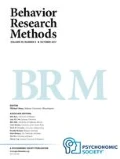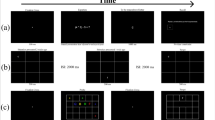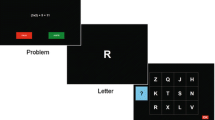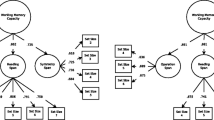Abstract
We present a battery of four working memory tasks that are implemented using MATLAB and the free Psychophysics Toolbox. The package includes preprocessing scripts in R and SPSS to facilitate data analysis. The four tasks consist of a sentence-span task, an operation-span task, a spatial short-term memory test, and a memory updating task. These tasks were chosen in order to provide a heterogeneous set of measures of working memory capacity, thus reducing method variance and tapping into two content domains of working memory (verbal, including numerical, vs. spatial) and two of its functional aspects (storage in the context of processing and relational integration). The task battery was validated in three experiments conducted in two languages (English and Chinese), involving more than 350 participants. In all cases, the tasks were found to load on a single latent variable. In a further experiment, the latent working memory variable was found to correlate highly but not perfectly with performance on Raven’s matrices test of fluid intelligence. We suggest that the battery constitutes a versatile tool to assess working memory capacity with either English- or Chinese-speaking participants. The battery can be downloaded from www.cogsciwa.com (“Software” button).
Similar content being viewed by others
References
Bayliss, D. M., Jarrold, C., Gunn, D. M., & Baddeley, A. D. (2003). The complexities of complex span: Explaining individual differences in working memory in children and adults. Journal of Experimental Psychology: General, 132, 71–92.
Beilock, S. L., & Carr, T. H. (2005). When high-powered people fail: Working memory and “choking under pressure” in math. Psychological Science, 16, 101–105.
Brainard, D. H. (1997). The Psychophysics Toolbox. Spatial Vision, 10, 433–436.
Conway, A. R. A., Kane, M. J., Bunting, M. F., Hambrick, D. Z., Wilhelm, O., & Engle, R. W. (2005). Working memory span tasks: A methodological review and user’s guide. Psychonomic Bulletin & Review, 12, 769–786.
Daneman, M., & Carpenter, P. A. (1980). Individual differences in working memory and reading. Journal of Verbal Learning & Verbal Behavior, 19, 450–466.
Daneman, M., & Merikle, P. M. (1996). Working memory and language comprehension: A meta-analysis. Psychonomic Bulletin & Review, 3, 422–433.
Ecker, U. K. H., Lewandowsky, S., Oberauer, K., & Chee, A. E. H. (2010). The components of working memory updating: An experimental decomposition and individual differences. Journal of Experimental Psychology: Learning, Memory, & Cognition, 36, 170–189.
Engle, R. W., Tuholski, S. W., Laughlin, J. E., & Conway, A. R. A. (1999). Working memory, short-term memory and general fluid intelligence: A latent variable approach. Journal of Experimental Psychology: General, 128, 309–331.
Fan, X. (2003). Using commonly available software for bootstrapping in both substantive and measurement analyses. Educational & Psychological Measurement, 63, 24–50.
Friedman, N. P., & Miyake, A. (2004). The reading span test and its predictive power for reading comprehension ability. Journal of Memory & Language, 51, 136–158.
Hertzog, C., Dixon, R. A., Hultsch, D. F., & MacDonald, W. S. (2003). Latent change models of adult cognition: Are changes in processing speed and working memory associated with changes in episodic memory? Psychology & Aging, 18, 755–769.
Hofmann, W., Gschwendner, T., Friese, M., Wiers, R. W., & Schmitt, M. (2008). Working memory capacity and self-regulatory behavior: Toward an individual differences perspective on behavior determination by automatic versus controlled processes. Journal of Personality & Social Psychology, 95, 962–977.
Kail, R. (2007). Longitudinal evidence that increases in processing speed and working memory enhance children’s reasoning. Psychological Science, 18, 312–313.
Kane, M. J., Brown, L. H., McVay, J. C., Silvia, P. J., Myin-Germeys, I., & Kwapil, T. R. (2007). For whom the mind wanders, and when: An experience-sampling study of working memory and executive control in daily life. Psychological Science, 18, 614–621.
Kane, M. J., Conway, A. R. A., Hambrick, D. Z., & Engle, R. W. (2007). Variation in working memory capacity as variation in executive attention and control. In A. R. A. Conway, C. Jarrold, M. J. Kane, A. Miyake, & J. N. Towse (Eds.), Variation in working memory (pp. 21–46). Oxford: Oxford University Press.
Kane, M. J., Hambrick, D. Z., & Conway, A. R. A. (2005). Working memory capacity and fluid intelligence are strongly related constructs: Comment on Ackerman, Beier, and Boyle (2005). Psychological Bulletin, 131, 66–71.
Kyllonen, P. C., & Christal, R. E. (1990). Reasoning ability is (little more than) working-memory capacity? Intelligence, 14, 389–433.
Lee, J., & Park, S. (2005). Working memory impairments in schizophrenia: A meta-analysis. Journal of Abnormal Psychology, 114, 599–611.
Lépine, R., Barrouillet, P., & Camos, V. (2005). What makes working memory spans so predictive of high-level cognition? Psychonomic Bulletin & Review, 12, 165–170.
Oberauer, K. (1993). Die Koordination kognitiver Operationen: Eine Studie über die Beziehung zwischen Intelligenz und “working memory” (The coordination of cognitive operations: A study on the relation of intelligence and “working memory”). Zeitschrift für Psychologie, 201, 57–84.
Oberauer, K. (2005a). Binding and inhibition in working memory: Individual and age differences in short-term recognition. Journal of Experimental Psychology: General, 134, 368–387.
Oberauer, K. (2005b). The measurement of working memory capacity. In O. Wilhelm & R. W. Engle (Eds.), Handbook of understanding and measuring intelligence (pp. 393–408). Thousand Oaks, CA: Sage.
Oberauer, K., Süß, H.-M., Schulze, R., Wilhelm, O., & Wittmann, W. W. (2000). Working memory capacity—facets of a cognitive ability construct. Personality & Individual Differences, 29, 1017–1045.
Oberauer, K., Süß, H.-M., Wilhelm, O., & Wittmann, W. W. (2003). The multiple faces of working memory: Storage, processing, supervision, and coordination. Intelligence, 31, 167–193.
Pelli, D. G. (1997). The Video Toolbox software for visual psychophysics: Transforming numbers into movies. Spatial Vision, 10, 437–442.
Raven, J. C. (1989). Standard progressive matrices, 1956 revision. Victoria: ACER.
Raykov, T. (1997). Estimation of composite reliability for congeneric measures. Applied Psychological Measurement, 21, 173–184.
R Development Core Team (2005). R: A language and environment for statistical computing [Programming language]. Vienna: R Foundation.
Salthouse, T. A., Babcock, R. L., & Shaw, R. J. (1991). Effects of adult age on structural and operational capacities in working memory. Psychology & Aging, 6, 118–127.
Schmader, T., Johns, M., & Forbes, C. (2008). An integrated process model of stereotype threat effects on performance. Psychological Review, 115, 336–356.
Schmiedek, F., Hildebrandt, A., Lövdén, M., Lindenberger, U., & Wilhelm, O. (2009). Complex span versus updating tasks of working memory: The gap is not that deep. Journal of Experimental Psychology: Learning, Memory, & Cognition, 35, 1089–1096.
Shute, V. J. (1991). Who is likely to acquire programming skills? Journal of Educational Computing Research, 7, 1–24.
Süß, H.-M., Oberauer, K., Wittmann, W. W., Wilhelm, O., & Schulze, R. (2002). Working-memory capacity explains reasoning ability—and a little bit more. Intelligence, 30, 261–288.
Turner, M., & Engle, R. (1989). Is working memory capacity task dependent? Journal of Memory & Language, 28, 127–154.
Unsworth, N., Heitz, R. P., Schrock, J. C., & Engle, R. W. (2005). An automated version of the operation span task. Behavior Research Methods, 37, 498–505.
Wittmann, W. W. (1988). Multivariate reliability theory: Principles of symmetry and successful validation strategies. In J. R. Nesselroade & R. B. Cattell (Eds.), Handbook of multivariate experimental psychology (pp. 505–560). New York: Plenum.
Author information
Authors and Affiliations
Corresponding author
Additional information
Preparation of this article was facilitated by a Discovery Grant from the Australian Research Council and an Australian Professorial Fellowship to the first author.
Rights and permissions
About this article
Cite this article
Lewandowsky, S., Oberauer, K., Yang, LX. et al. A working memory test battery for MATLAB. Behavior Research Methods 42, 571–585 (2010). https://doi.org/10.3758/BRM.42.2.571
Received:
Accepted:
Published:
Issue Date:
DOI: https://doi.org/10.3758/BRM.42.2.571




